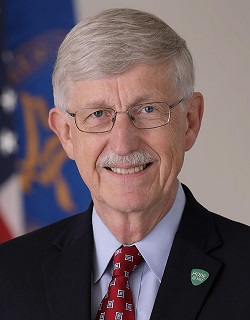- Home
- News Archive
More News
Want to Read Locked Articles?
Already Have an Account?

Register A Corporate Account
A corporate account gives you access to licensed reports and subscriptions, the latest news, a personalized dashboard, and weekly emails with news and data.
Francis Collins, MD, PhD, to Step Down as NIH Director with Legacy as ‘Extraordinary’ Scientist, YouTube Singing Star
Author: Joan McKenna

Francis Collins, MD, PhD, announced Oct. 5 that he would end his tenure as the director of the National Institutes of Health by the end of 2021.
The physician-geneticist, 71, took office in August 2009 in a position that oversees 27 agencies and funds tens of thousands of research projects.
President Joe Biden paid tribute to Collins following the announcement, calling him “one of the most important scientists of our time.”
And Health and Human Services Secretary Xavier Becerra said of Collins: “Few people could come anywhere close to achieving in a lifetime what Dr. Collins has at the helm of NIH. It takes an extraordinary person to tackle the biggest scientific challenges facing our nation—and under three presidents, amidst three distinctly different chapters of American history.”
During Collins’ 12-year leadership, the NIH’s budget grew by 38 percent, to $41.3 billion in 2021 from $30 billion in 2009, as he proposed and established bold initiatives to tackle Alzheimer’s disease, cancer, opioid use, rare diseases, and the pandemic.
Washington insiders point to the Virginia native’s ability to talk about science at any level for his success at charming research funding out of politicians on both sides of the aisle.
He occasionally has employed his guitar skills in that mission, and those skills are evident in a variety of YouTube videos, ranging from parodies of popular songs posted on NIH channels, to a rendition of "Hallelujah" that he sang with Renee Fleming and the National Symphony Orchestra in 2017 at The Kennedy Center.
He also loves to ride motorcycles.
The National Alliance for Eye and Vision Research praised Collins when he was nominated for NIH director, saying the organization appreciated Collins’ understanding of the value of eye research.
Following his retirement announcement, the group praised him again, especially for assembling a strong leadership team at the agency that will build on his legacy and appointing Michael Chiang, MD, as director of the National Eye Institute in 2020.
Prior to heading the NIH, Collins led the completion of the human genome project in 2003 as director of the NIH’s National Human Genome Research Institute (NHGRI), for which he received the Presidential Medal of Freedom from President George W. Bush.
Collins plans to continue leading his research laboratory at the NHGRI, which is working on diabetes genomics and gene therapy for a rare premature aging disorder.
Biden now must fill the position of NIH director, along with that of FDA commissioner.

